- Home
- Patrick Robinson
U.S.S. Seawolf am-4 Page 32
U.S.S. Seawolf am-4 Read online
Page 32
“What was it, sir…that main cable they dug up last month?”
“I thought it must be…but I’m not so sure now. I think there’s a fault inside the building. I might ask one of you to give me a hand for ten minutes this afternoon.”
“No trouble, sir…glad to help.”
Quinlei Dong strolled quietly back toward his car and moved around to the far side, out of the view of the guards. Then he rounded the corner of the building, checked to see that no one was watching, and sprinted across the street to another tall brick building in which there was a small, gray steel back door. This was the old dockyard stores, derelict now, unused for the past five years, and because of budget restrictions likely to stay that way for the next five. The modern Chinese Navy spent money on new ships, not old buildings.
Dong knew it was open. He had deliberately wrecked the locking mechanism five days earlier. And now he grabbed the handle and twisted, pulling the door outward and slipping inside, closing it behind him softly.
He crossed the dark, deserted floor, making for the iron stairway, which led right up to the roof seven floors above. He walked slowly, not knowing quite how he would deal with the locked door at the top. When he got there, the problem solved itself. The door was jammed shut with two big bolts, top and bottom. All he had to do was open them, and he was on the roof.
He stepped out carefully, crouching low, moving slowly inside the parapet. At the southern edge, overlooking the main submarine jetty, there was a chimney block, and he pressed back against it, staring down at the guard patrols in front of USS Seawolf. If one of them took a real hard look at the roof, they would see him. That was his main assessment.
But now he opened the toolbox and took out the round viewing lens. He took his measurement, knowing that the spot on the deck he sought was exactly half the distance back from the rear of the sail, as the total height of the fin: i.e., if the sail was 40 feet high, he was looking for a geometric spot 20 feet back. The actual numbers were irrelevant. It was that half-distance stat that counted. Dong could not measure feet and inches, but he could measure halves and doubles with his eye and his steel ruler.
He put his thumb on the ruler at the halfway mark. Then he took it horizontal instead of vertical, and there in front of him was the precise spot he sought. He held the ruler steady with one hand and lifted the lens to his eye, with the other focusing the crosshairs precisely at the end of his own thumb. Directly below that, he knew, was Seawolf’s nuclear reactor. Now he had only to fix the device to the chimney block, which was the difficult part.
A small bracket would need to be drilled and screwed into the brickwork at a spot just above his head. If he stood on the toolbox he could manage that. It was the noise that worried him, but it would not take long, just two holes, about an inch and a half deep. He could do that.
Dong removed the black parts from the box, and took out a screwdriver and a portable drill. Then he took off his jacket and wrapped it tightly around the drill to suppress the high-pitched whine of the electric tool. Then he stood up on the toolbox, held the bracket in place and hit the button on the drill, which bit into the brickwork. The jacket kept the noise to a minimum, and the gusting southwest wind scattered what sound there was high and away. Twice he went into the wall, and then he stopped and ducked right down, and stayed there for 10 minutes.
Finally he stepped back onto the toolbox, and, using a hammer and a thin Phillips screwdriver, rammed the plastic plugs into the drill holes. Then he lifted up the bracket and screwed the first bolt into the first plug. Then he did the second, fixing the bracket firmly to the chimney.
Five minutes later he slid the main fitting onto the bracket. Then he climbed up the sloping part of the roof, keeping one foot on the toolbox, and stared down at USS Seawolf, placing the crosshairs exactly at the end of his thumb, aiming directly at the spot above the reactor.
Dong connected the wires between the main box and the power pack, tightening the terminals with small electrician’s pliers. Then he slid the power pack into the bracket where it fitted perfectly. He turned on the switch and watched the green light flicker and harden up. Then he climbed up the roof again and checked his bearing, checking again the accuracy of his measurement.
It had been a fairly simple job, but for something this important, nothing was simple. He took a section of gray plastic out of the box and wrapped it carefully around the device, securing it below with a trash-bag tie. Now all he needed to do was escape.
Back down the iron stairway he went, opening the door slowly, and ensuring that the coast was clear. Not a soul was in the back street behind the building, and he closed the door carefully, walking back to the building in which he was officially working.
The guards were still there, and he went inside again, and climbed the stairs. In fact, he needed only to clean up, but he needed an excuse to return again tomorrow, and he parted several wires, leaving them exposed on the carpet.
Fifteen minutes later, he went back downstairs and said goodbye to the guards, telling them he’d come back to finish tomorrow afternoon, because he had to replace a faulty switch that was the cause of the problem. He’d need less than an hour.
No one bothered to search him on the way out, and the same guard who had advised him about the quality of life on the way in now did the same on the way out. “Good day for family, hah? You go have a nice time, Mr. Quinlei…I’ll hold the fort here…ha-ha-ha.”
2400 (local). Saturday, July 15.
Office of Admiral Morgan.
The White House.
The President’s National Security Adviser right now answered to no one. He had been given firm orders by the Chief Executive to get Linus back no matter what. The President understood that this meant Seawolf had to be, essentially, scuttled. And that the Navy SEALs team would have to go in guns blazing to break open the jail and subdue whatever opposition there was.
The military details did not need to be relayed to this particular President in this particular incident. He wanted his only son back, and that was the end of it. Admiral Morgan had been tasked to mastermind the rescue, and that he had most certainly done. So far.
And now he was in conference with his most trusted operators: Admiral George Morris, Director of the National Security Agency at Fort Meade, and Jake Raeburn, head of the CIA’s Far Eastern desk. It was midnight in Washington, one o’clock the following afternoon in the South China Sea.
Admiral Morris had reasonable news. Seawolf’s reactor had been running steadily now for three days, and was still doing so. The satellites showed no visible sign of increased activity inside the jail on Xiachuan Dao, nor was there any sign of a transfer of prisoners, although it did seem that certain members of the American crew were being relayed back and forth to the Canton dockyard. The Chinese naval hardware had not increased, but still consisted of one fast attack patrol boat and two helicopters, occasionally only one.
Admiral Morgan himself had a signal from John Bergstrom in Coronado. And that was excellent news. Nothing elaborate, no details, just a coded Nighthawks roosting. Which meant that the SEAL reconnaissance team had been into Xiachuan Dao, done their business and were safely back in the Ronald Reagan. Arnold Morgan was hugely relieved.
Jake Raeburn also had good news. His man in Canton had collected the laser marker and established it high on a building overlooking the submarine. If there were no hitches, he would switch it on at 1900 local time the next day, and the bomb would hit two hours later.
This meant Nighthawk was GO. Lt. Commander Rick Hunter’s big SEAL team would hit the beach at Xiachuan Dao sometime before 2300. After that it was in the lap of the gods. But the SEALs had done it before, and the admiral believed they could do it again. Admiral Bergstrom was confident. In Colonel Frank Hart they had the best possible overall commander. The only question was how close inshore the submarine commanding officers could go before they had to surface.
Arnold Morgan was counting on the fact that the massive diversion
in Canton Harbor would cause such a commotion that there would not be a warship anywhere around the prison island with the slightest inclination to be looking for American submarines. The crisis up the Pearl River would be all-consuming, and a whole lot worse than Three Mile Island.
The three men continued to speculate in hushed tones as to the possible outcome of the mission. But shortly before 0100 the telephone rang, and this time the news was somewhere between suspect and bad.
The call was for Admiral Morris. One of his operators studying satellite pictures had made a shrewd observation, that a fleet of Chinese Navy trucks had suddenly appeared out of nowhere in the town of Yangjiang on the mainland, some 45 miles northwest of the jail. The operator counted a total of 12 trucks, painted in dark blue naval livery. In addition, a large Russian-built troop transporter helicopter had just landed at Xiachuan.
“I just wondered, sir, whether this might add up to a movement of the prisoners — you know, perhaps leaving the island and heading off to some inland jail. Neither the trucks nor the chopper was anywhere in sight four hours ago, and there’s a fairly good road between Yangjiang and Southern Fleet Headquarters at Zhanjiang.”
“Thank you, Lieutenant…very well observed. I’m grateful. Let me know if anything else catches your eye, will you?”
“Who’s seen what, George? Lay it right on me,” rasped Admiral Morgan.
“My guys think they might be getting ready to move the prisoners.”
“WHAT? NOW?” thundered Arnold Morgan. “JESUS CHRIST! NOT NOW!”
“Well, it’s two in the afternoon over there. I suppose it’s possible. But it is Sunday. I shouldn’t think they’d do much until Monday morning. And if they did, there wouldn’t be a damn thing we could do about it, except watch.”
“But what have your guys seen?”
“A convoy of twelve Navy trucks arrived in Yangjiang, which is just about the nearest major town to the island, about forty-five miles away to the northwest. And a big troop transporter helicopter just landed at Xiachuan…”
“That’s not bad. That’s fucking terrible,” snapped the admiral.
“Well, not if they don’t plan to hit the road until Monday morning. If that’s the case, we don’t care one way or the other.”
“No, I suppose not. And anyway, there’s not much we can do about it — just zap the submarine and the dockyard, and let the prisoners go. Which will not please the Chief.”
“No, I suppose not, Arnie. But even Linus Clarke cannot be worth a war with China, a war in which they might feel compelled to slam a West Coast city in retaliation.”
1000 (local). Sunday. July 16.
Admiral’s Briefing Room.
USS Ronald Reagan.
With four hours to go before departure back to the island, Lt. Commander Rusty Bennett was operating on pure adrenaline. Like his seven colleagues, he had slept most of the way from Xiachuan to the carrier, and he would try to sleep going back in this afternoon.
However, right now he was in a maelstrom of activity. The weather forecast was perfect, more heavy rain before midnight, sweeping up from the southwest the way it had been for over three weeks. The senior SEAL officers were poring over the maps they had drawn of the jail, studying the precise distances from the new assault point on the beach, a half mile from the watchtowers. Rusty and Colonel Hart were noting the heights and times on distance and assessing the Chinese guard strength. Rusty could tell that the colonel was on the edge of his nerves as he paced the room, anxiety written all over his face.
Lt. Commander Rick Hunter sat silently with blowups of the maps, measuring distances with a steel ruler, hitting the STOP-START buttons of his stopwatch, counting out the seconds, trying to imagine in his mind the time it would take his men to cross the outer track and scale the wall, dragging the black padded ladders behind them.
Over and over he checked the patrol times, writing in his notebook the precise whereabouts of the guards when his boys would bolt across the rough ground to the wall. He counted out the seconds it would take for the guys to take out the four tower guards and then get the ladders back to the ground, ready for the second assault wave on the jail wall. This would be made by the men who must remove the patrolling guard inside the wall without being heard by the patrol outside the wall. He and Frank Hart had long decided that the three, silent killers required for this move would be the SAS men from Bradbury Lines in England, Sergeant Fred Jones and his corporal, Syd Thomas, plus the ex-paratrooper Charlie Murphy.
At this point, all three commanders knew they must be prepared to “go noisy.” But Rick Hunter and Frank Hart were desperately trying to buy a few more minutes to blow up the guardroom, before the patrol boat, choppers and comm room were taken out simultaneously.
“I don’t think we can expect them to wipe out the guard patrol and then get across the yard without being spotted by anyone, and then hit the guardroom.” That was the colonel’s assessment. Rick thought it might be possible, but agreed it was unlikely. “Better to get three more guys up and over while we hold the watchtowers and slam the guardhouse right on time…exactly when the others explode.”
Both men knew the problem. There just might be a telephone or even a radio in the guard house. If the three SAS men were seen by anyone, the alarm would be raised and the Chinese just might get a signal away before the rest of the communications went out. Three extra men inside the jail could dictate the life span of any guard house communications. “And that way,” said Rick, “the SAS guys can concentrate on opening the main gate, either with explosive or peacefully, depending on the opposition.”
“Okay,” said Rusty. “That means we leave the ladders in place after the guys clear the wall. How many seconds do we have before the patrol rounds the corner and sees them?”
Rick studied his notebook. “Thirty…max. Look, the guard is right here when the SAS guys go in. It takes ’em forty-seven seconds to walk down this side before they get to the corner. I’ve got seventeen seconds from the bottom of the wall…they’re taking grapplers, right? For the fifteen-foot drop over the other side.…Okay, make sure the next three guys with the satchel bombs know exactly where the grapplers will be. If they’re quick, they can kick the ladders over flat when they reach the top of the wall. They have about thirteen seconds before the outside guards have any view at all…”
And so it went on, into the third and fourth hours, the detailed notes, the fractional times, the assessments, the risk element, the need for sudden noisy brutality, the contingency plans: “What if these guys are spotted…what’s our number one priority if someone blows the whistle before we’re quite ready…THE COMMS, always the comms. Hit that and they cannot get reinforcements. Fail to hit that, and we’re all dead.”
On an intellectual level, the colonel had a serious problem with the limpet mines on the patrol ship, which would need to be fixed with a timed detonation of, perhaps, 60 minutes while the SEALs put everything else in place. Which made that timing device in the water under the ship extremely important.
“Too important,” said the colonel. “The timing of the entire mission is dependent on a limpet mine. Because when that blows, we have to go noisy. And that means everything else we do is absolutely dictated by the moment the limpets will blow. I’m unhappy with that. But I’m even more unhappy with the sequence if something goes wrong.”
“How do you mean, sir?”
“Okay…we all realize there may be a point when some Chinese guard blows the whistle, perhaps twelve minutes before we’re quite ready. Let’s say he yells, at which point we go automatically…the guys with the bombs outside the comms room hurl ’em in, someone blows the choppers, we hand-grenade the towers, blow the gates and fight our way in, firing at will, making the absolute maximum of our surprise element.
“BUT, down on the jetty there’s a patrol boat with a fully active radio system. Inside the boat there may be a trained operator, plus a couple of guards. They hit the military airwaves and announce that the jai
l is under severe attack. Because right now it’s going to sound like World War Three…the boat has of course only ten minutes to live, but that ten minutes could be enough, and I don’t like it. Because if they get a signal away, you guys are dead.”
“Hmmmmm,” said Rick Hunter. “I don’t like it either.”
“Well, it’s easily solved.”
“It is?”
“Sure. Let’s not use limpet mines at all. We’ll put two guys behind the jetty with antitank weapons, those very light, hand-held launchers…either when they hear the first bang or on your radio command, they slam a couple of those babies straight into the ship fore and aft, and no one’s making any phone calls.”
“Beautiful. That’s a great call, sir. Same with the choppers?”
“Definitely. We don’t want any fixed time detonations. Because in the end they could turn out to be a real PITA.”
“A what?”
“PITA. Pain in the Ass.”
Lt. Commander Hunter shook his head. There really was something about Frank Hart, super brain, always on top of the situation, always with time enough for the wry quip. Bergstrom said his appointment had come direct from the White House.
He was honest, too. “Rick,” said the colonel, “I like the euphemism PITA so much, I would like to claim it as an original, complete with copyright and exclusive usage clause. But I cannot do so.”
“Why not?”
“Admiral Morgan invented it, and he likes it more than I do. But I’m still using it.”
Down below, the SEALs were preparing to go, checking their weapons, cleaning and lightly oiling their guns, adjusting their camouflage. Some were already blacking their faces and hands, tightening their belts, standing alone, practicing their readiness to attack. You could have cut the tension in those rooms with a kaybar fighting knife. Petty officers walked among them, encouraging, warning, urging them to be alert at all times, remembering always the creed of caution, of silence, forbidding the wearing of any jewelry, checking pockets for loose change that might rattle and cost someone his life.

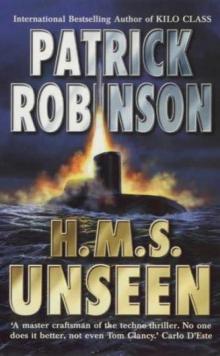 H.M.S. Unseen am-3
H.M.S. Unseen am-3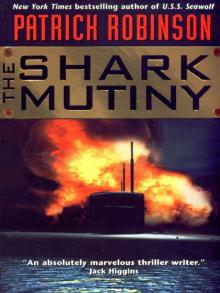 The Shark Mutiny (2001)
The Shark Mutiny (2001)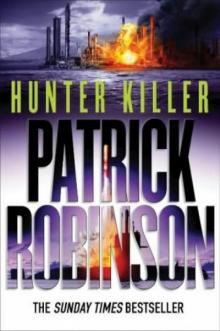 Hunter Killer am-8
Hunter Killer am-8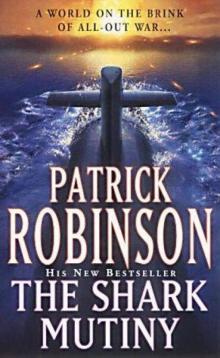 The Shark Mutiny am-5
The Shark Mutiny am-5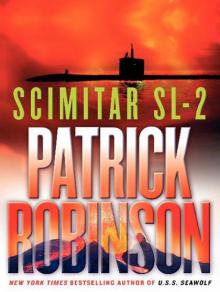 Scimitar SL-2
Scimitar SL-2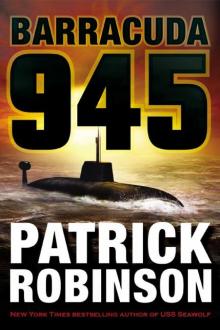 Barracuda 945 am-6
Barracuda 945 am-6 Hunter Killer
Hunter Killer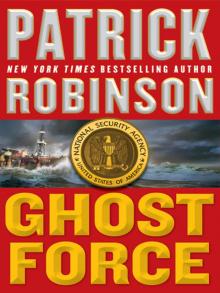 Ghost Force
Ghost Force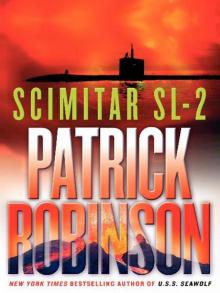 Scimitar SL-2 (2004)
Scimitar SL-2 (2004)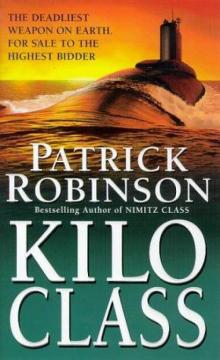 Kilo Class am-2
Kilo Class am-2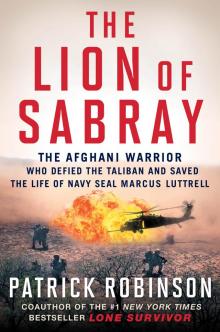 The Lion of Sabray
The Lion of Sabray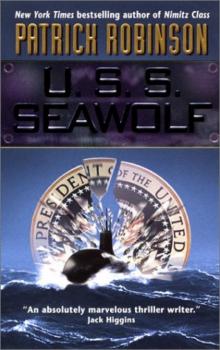 U.S.S. Seawolf am-4
U.S.S. Seawolf am-4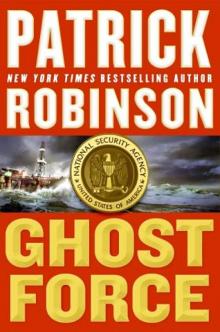 Ghost Force am-9
Ghost Force am-9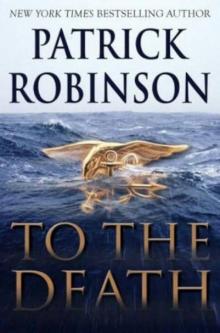 To the Death am-10
To the Death am-10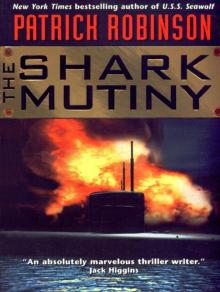 The Shark Mutiny
The Shark Mutiny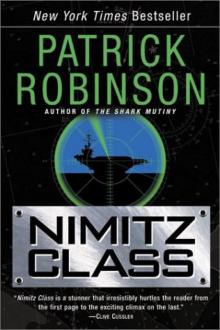 Nimitz Class am-1
Nimitz Class am-1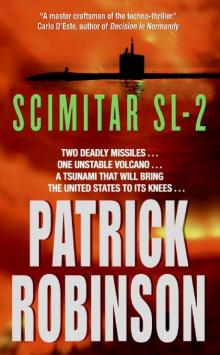 Scimitar SL-2 am-7
Scimitar SL-2 am-7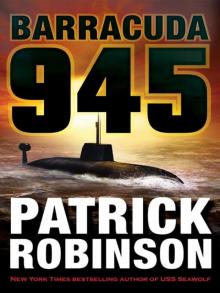 Barracuda 945
Barracuda 945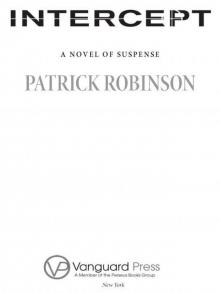 Intercept
Intercept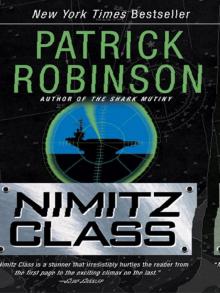 Nimitz Class (1997)
Nimitz Class (1997)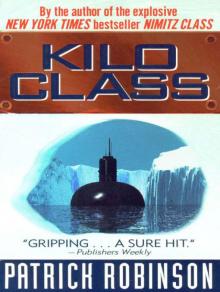 Kilo Class
Kilo Class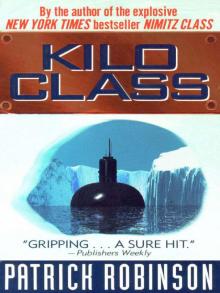 Kilo Class (1998)
Kilo Class (1998) Diamondhead
Diamondhead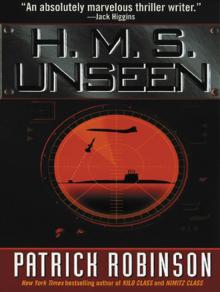 H.M.S. Unseen
H.M.S. Unseen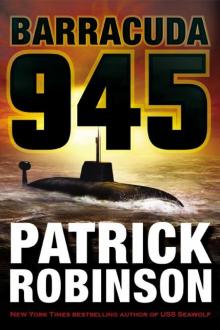 Barracuda 945 (2003)
Barracuda 945 (2003)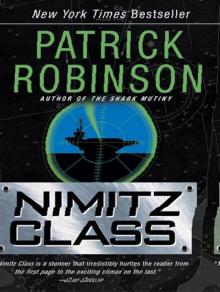 Nimitz Class
Nimitz Class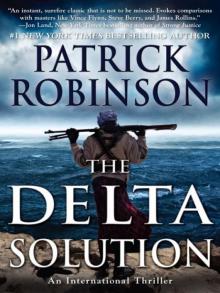 The Delta Solution
The Delta Solution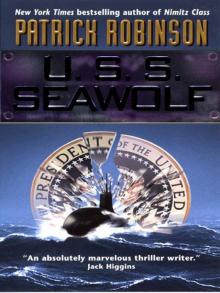 U.S.S. Seawolf
U.S.S. Seawolf